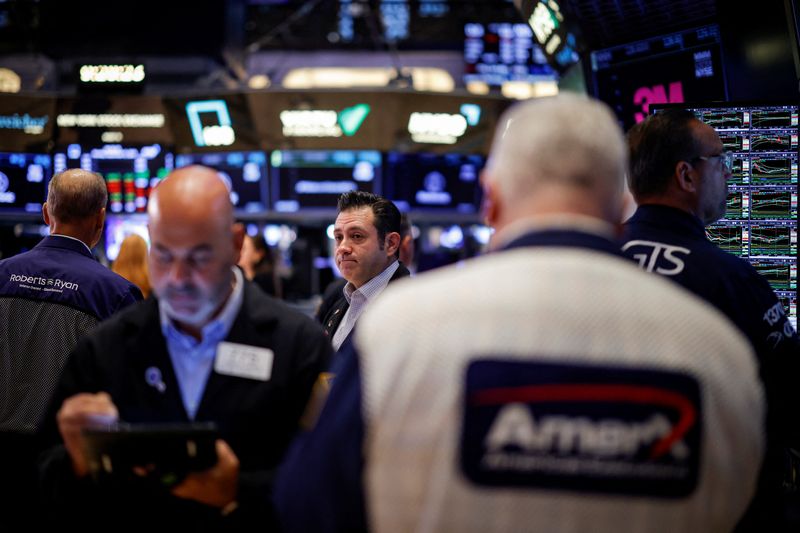TSX lower as gold rally takes a breather
Investing.com -- Inflation data this week will likely test investors mettle against the background of Friday’s robust jobs report and uncertainty over Donald Trump’s policy plans. Earnings season gets underway, and oil prices are at multi-month highs as energy traders prepare for supply disruptions. Here's your look at what's happening in markets for the week ahead.
-
Inflation data
With a revival of inflation one of the key risks facing equity markets Wednesday’s CPI data will be closely watched.
Markets have already pushed out expectations for the next Federal Reserve rate cut to June after Friday’s unexpectedly strong jobs report showed payrolls increased by 256,000 last month, far more than forecasts of 160,000 and the unemployment rate fell to 4.1%.
Economists are expecting the December CPI to show a 2.9% year-over-year increase.
While the Fed was confident that inflation had moderated enough to start cutting interest rates in September, the pace of annual inflation has remained above the Fed's 2% target. The Fed now projects inflation will rise 2.5% in 2025.
Minutes from the Fed's latest meeting, released on Wednesday, showed policymakers are concerned Trump's policies on trade and immigration could prolong the effort to return inflation to target.
-
Big banks kick off earnings
JPMorgan (NYSE:JPM), Wells Fargo (NYSE:WFC), Citigroup (NYSE:C) and Goldman Sachs (NYSE:GS) will kick off fourth-quarter earnings on Wednesday, while Bank of America (NYSE:BAC) and Morgan Stanley (NYSE:MS) report results on Thursday.
Robust investment banking fees, strong trading income and easing pressure to boost deposit rates are all expected to make for an upbeat earnings season for U.S. banks.
Expectations for bank results were also boosted following Trump’s election victory. The president-elect is expected to usher in a wave of deregulation and business-friendly tax reforms, which could significantly enhance banks' profitability.
S&P 500 company earnings are expected to have climbed nearly 10% in the quarter from a year earlier, according to LSEG IBES data cited by Reuters.
-
UK inflation
Wednesday’s UK inflation data will be in focus after last weeks selloff in UK government bonds, known as gilts, heaped pressure on the new Labour government as it seeks to stimulate the moribund economy.
British government bond yields have been climbing steadily since September, reflecting reduced expectations of Bank of England rate cuts, extra borrowing in the new government's Oct. 30 budget and higher US Treasury yields with Trump expected to pursue a loose fiscal policy and raise tariffs.
The December CPI is expected to show an annual increase of 2.6%, remaining above the Bank of England’s 2% target.
Comments by BoE officials will also be in the spotlight with Deputy Governor Sarah Breeden expected to speak on Tuesday and MPC member Alan Taylor due to deliver remarks the following day.
-
China data
China is to release a slew of data towards the end of the week which will give investors a chance to see how the word’s second biggest economy is performing as it faces the blow of impending US tariff hikes.
GDP data due on Friday is expected to confirm that the economy met its 5% annual growth target for 2024, as previously announced by President Xi Jinping at the end of December.
Beijing is also to release data on house prices, industrial production and retail sales.
China’s Vice Finance Minister Liao Min said Friday that Beijing has ample fiscal policy space and tools to support economic growth this year and it will step up spending to spur investment.
-
Oil sanctions
Oil prices rallied more than 3% to their highest in three months on Friday as traders braced for supply disruptions from the broadest U.S. sanctions package targeting Russian oil and gas revenue.
President Joe Biden's administration imposed fresh sanctions targeting Russian oil producers, tankers, intermediaries, traders and ports, aiming to hit every stage of Moscow's oil production and distribution chains.
Brent crude futures settled at $79.76 a barrel after crossing $80 a barrel for the first time since Oct.7. US West Texas Intermediate crude settled at $76.57 per barrel.
The timing of the sanctions, ahead of Trump's inauguration on Jan. 20, makes it likely that he will keep the sanctions in place and use them as a negotiating tool for a Ukraine peace treaty, analysts said.
